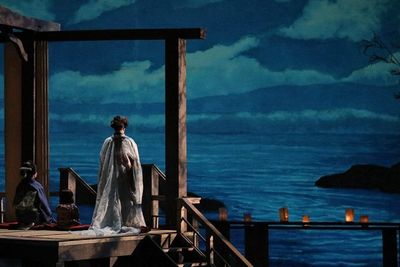From Madame Butterfly:
Butterfly: They say across the seas that if a butterfly falls into a man's hand, he'll pierce its heart with a pin and fix it to a board.
Pinkerton: There's some truth in that; and do you know why? So that it shouldn't fly away again.
That rough translation fairly sums up the transactional nature of life and love in Giacomo Puccini's opera Madame Butterfly. A 999-year lease on a house (with a monthly option to cancel) and, similarly, a marriage "in the Japanese fashion" for 999 years. A bought 15-year-old bride for an American Navy Lieutenant. A house on a hill. A waiting game. And a fateful decision. But only one realizes this marriage isn't for keeps.
It should come as no surprise that things will not end happily in this tale. After all, this is opera and it rarely goes well for anyone, if we're being completely honest. Yet year after year, Madame Butterfly remains one of the most enduring and popular operas in the entire canon. The Nashville Opera's season-opening presentation proves exactly why. The simplest possible reason I can give you is that Madame Butterfly is lyrical, approachable, and tells a story that feels eternally fresh and necessary.
Make no mistake, though. Butterfly is an incredibly complicated piece when one examines the troubling political realities of Western Imperialism, of a young woman abandoned by the man she understands to be her husband, and the dire consequences that result from their reunion some three years on.
First and foremost, the reality cannot be ignored that Butterfly was written by Italian men whose familiarity with Japanese culture was, at best, tangential. Though that's rarely stopped writers, if we're being very honest. Consider, if you will, Gilbert and Sullivan's The Mikado; Rodgers and Hammerstein's South Pacific, The King & I, and Flower Drum Song; and Boublil and Schönberg's Miss Saigon, itself a retelling of Madame Butterfly. In every one of these works, white men took it upon themselves to tell the stories of Asian characters without a genuine cultural understanding of the people and places they've created.
Cio-Cio-San (the title character, also referred to as Madame Butterfly) is presented as a Geisha, though that's essentially understood by the librettists to be a Rent-A-Bride, a courtesan. (In Miss Saigon, the writers present Kim as a bar girl, a naif surrounded by prostitutes.) While Butterfly doesn't quite go to this extreme, the contemporaneous understanding of a Geisha might as well line her up on the corner. After all, the possibility of Butterfly having to return to being a Geisha in Pinkerton's absence is weighed against taking her own life. Not a pretty choice.
As Butterfly, soprano Elizabeth Caballero is forced to walk the delicate line of playing the fifteen year old bride who, by the end of the opera, is only (maybe) eighteen or nineteen. Her light, lively voice does the trick. It provides enough power to clearly cut through the sumptuous orchestrations, but never gives the impression (and I mean this as a total compliment) of age or experience. Caballero is stunning in shimmering kimonos and moves beautifully through the space. Her acting choices in the silent vigil, the "Coro a bocca chiusa," are as heartbreaking as her passion and desperation in the work's most famous aria, "Un bel dì vedremo."
Thankfully, Nashville Opera Artistic Director John Hoomes' directorial choices manage to avoid delicate laughter behind fans and stilted movement that can be a true pitfall for productions involving Asiatic women. Instead, the entire production presents a gorgeous verisimilitude, from the sumptuous costumes, to the incredible physical production (created for the Los Angeles Opera), and the evocative lighting design. I'll definitely admit a bit of fear for the cast's ankles on the steep rake of the house, but thankfully no one wiped out.
As Lieutenant Pinkerton, tenor Adam Diegel embodies the American dream, kitted out in Navy class-A whites. His powerful instrument is the stentorian voice of American machismo, of the Manifest Destiny opening Japan by hook or crook. When I spoke with Diegel last month, he emphasized the necessity of the actor playing Pinkerton having the right presence and allow me to assure you that he is marvelous in the role. His bravado in "Dovunque al mondo" contrasts beautifully with his tender duet "Bimba dagli occhi pieni di malia." And when the house rained down a sheaf of "boos" during the bows, a smile spread across Diegel's face. Sometimes playing the bad guy has its rewards.
Cassandra Zoé Velasco's Suzuki (Butterfly's maid) and Lester Lynch as Sharpless (the U.S. Consul) are standouts. Both characters are the proverbial canaries in the coal mine. Both see the dangers inherent in the marriage between Butterfly and Pinkerton and both are ignored to the peril of everyone involved.
Dean Williamson, conducting the Nashville Opera Orchestra, led a lithe, spirited account of the score, allowing the lush strings to linger and create meditative spaces amid the ever more chaotic gyre enveloping the characters' lives.
If you're new to opera, Madame Butterfly provides an excellent entrance point to begin your experience of the artform. And if you've witnessed this tragic tale unfold before, I nearly guarantee that you're going to find this production to be fresh, engaging, and gorgeous to behold.
You have only one more opportunity to experience Nashville Opera's production of Madame Butterfly. The limited run ends with Saturday night's 8 p.m. performance at TPAC's Jackson Hall. Tickets are available at tpac.org and at the box office.
CLICK HERE for more Nashville Opera coverage.
